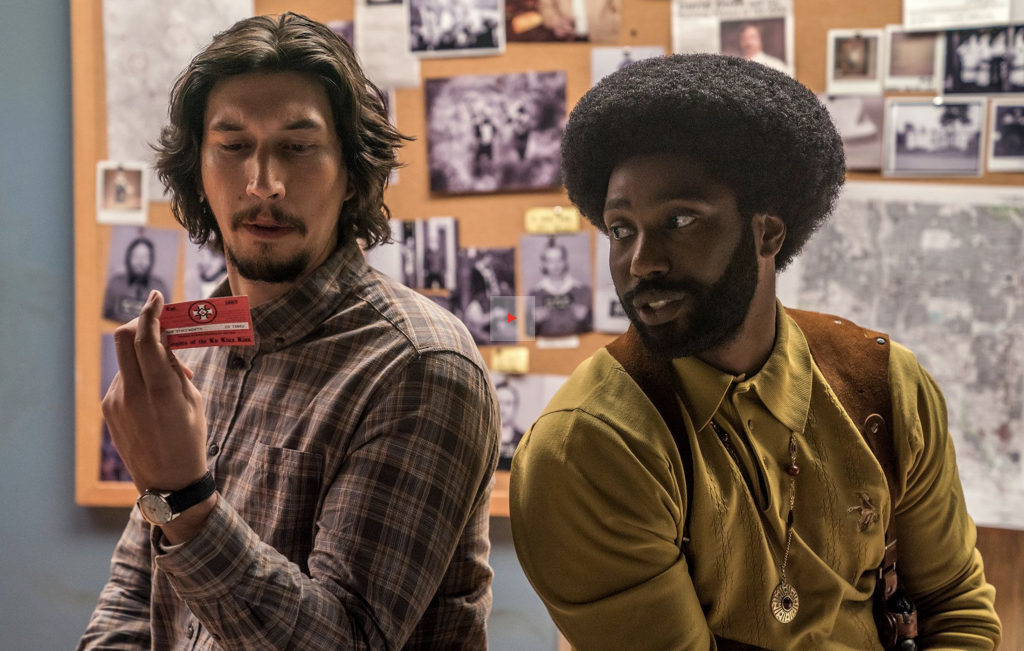There are few filmmakers in America more associated with tackling racial issues than Spike Lee, the African-American writer-director who exploded onto the national consciousness nearly 30 years ago with 1989’s incendiary classic “Do the Right Thing.”
That tale of a riot breaking out in Brooklyn on the hottest day of the year presented a truly daring cinematic vision that grew over the next couple of decades to portray the life of “Malcolm X,” interracial romance in “Jungle Fever,” the Million Man March in “Get on the Bus” and rampant violence in inner-city Chicago with “Chi-Raq.”
Yet aside from the blockbuster heist thriller “Inside Man” in 2006, Lee had nearly lost his relevance with bomb after bomb throughout the 2000s. But he’s come roaring back in a big way with his latest film, “BlacKkKlansman,” which won the top prize at this year’s Cannes Film Festival and arrived August 10 with plenty of buzz.
It is easily his best film since the turn of the century. It has the uncanny timing of being released on the one-year anniversary of the white-supremacist march and riots in Charlottesville, Virginia. Still, this powder keg of a movie might be unsettling to some viewers.
The film follows the incredible true-life story of Ron Stallworth (John David Washington), who became the first African-American police officer in Colorado Springs, Colorado, thanks to the city’s efforts to finally welcome a black officer.
Soon, the ambitious rookie quickly grows tired of his initial assignment of working the overnight shift in the criminal records room. Stallworth wants to make a real impact on his city, and believes he has the skills to bring down its particularly dangerous Ku Klux Klan chapter.
Teaming up with a Jewish cop named Flip Zimmerman (Adam Driver), Stallworth activates a crazy plan in which he will infiltrate the local KKK. The idea is for Stallworth to handle all the conversations possible by phone, while sending in Zimmerman to pretend to be him whenever an in-person meeting is required.
Things come to a boil as the national Klan leader David Duke (Topher Grace) comes to town at the same time the Black Student Union is hosting a legendary black activist. Stallworth and Zimmerman have to figure out how to uncover a dangerous bombing plot at the same time they’re trying to keep their cover and maintain their own private sanity and sense of identity.
“BlacKkKlansman” is 135 minutes long, yet stuffed to the limit with audacious plot points, stunning dialogue and vivid performances. Washington — the son of Denzel — knocks his first lead role out of the park, combining swaggering attitude with hilarious comic chops and occasionally searing emotion to create an indelibly memorable character out of Stallworth.
Just like the film itself, he has to be considered an instant frontrunner for an Oscar nomination.
He’s matched note for note by Driver as Zimmerman, a man who finds himself in greater danger than Stallworth, even though this is Stallworth’s crusade. Driver walks an electrifying tightrope with his performance, as he alternates contempt for the ignorant bigots around him with a need to spew even more venom than they do to maintain his cover and very survival.
Somehow, Lee and his team of three other screenwriters manage to make the most outrageously offensive slurs imaginable work in both dramatic and darkly comedic fashion while connecting the ugliness of 1970s American racial attitudes with the tragic events in Charlottesville just a year ago.
Even one of its weaker spots is still impressive: An extended sequence intercutting Duke leading a KKK initiation ceremony and screening of the landmark racist film “Birth of a Nation” with a horrific tale of a racist murder recounted by the elderly black activist goes on nearly 15 minutes, and doesn’t directly fit into the story, but still makes for a riveting segment nonetheless.
While this is a superb film, viewers should be warned it is one that features a lot of racial and anti-Semitic slurs along the way. They absolutely fit the context of the film’s atmosphere and time frame, but it is jarring to hear that kind of language used with such frequency and force.
It’s also a daring tightrope walk, as Lee and his co-writers manage to make these lines work as hilarious stingers when Stallworth is pretending to be a white racist joining in the “fun” on the phone with the Klan members but maintaining their ugliness in every other situation.
Layered over it all is Terence Blanchard’s lush score, providing both propulsion and beauty to the proceedings onscreen and bringing it all to greater life. While working with an unusually potent screenplay, Lee also reins in his frequently self-indulgent visual techniques to keep the film focused and moving forward like a freight train through its often surreal events.
The film uses a couple of stunning techniques to incorporate actual footage of the white supremacist march and the driving rampage that killed Heather Heyer at Charlottesville, leaving viewers with a devastating reminder of how close the dangers of racism lie beneath the surface of modern life.
A film that engages the mind and enrages the spirit while often provoking gales of laughter, “BlacKkKlansman” is can’t-miss viewing for adults looking for both fun and substance in the dog days of summer.
SPECIAL OFFER! 44 issues of Angelus for just $25! For less than 50 cents a week, get the finest in Catholic journalism with first-rate analysis of the events and trends shaping the Church and the world, plus the practical advice from the world’s best spiritual writers on prayer and Catholic living, along with great features about Catholic life in Los Angeles. Subscribe now!

